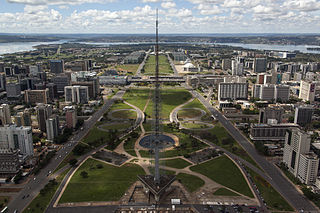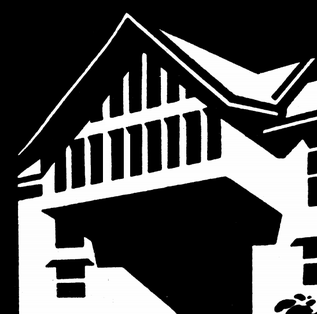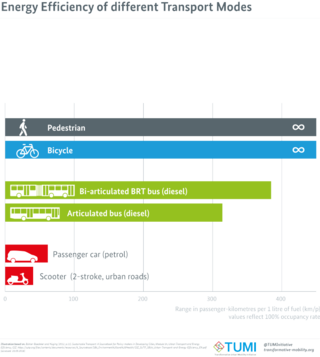
Urban design is an approach to the design of buildings and the spaces between them that focuses on specific design processes and outcomes. In addition to designing and shaping the physical features of towns, cities, and regional spaces, urban design considers 'bigger picture' issues of economic, social and environmental value and social design. The scope of a project can range from a local street or public space to an entire city and surrounding areas. Urban designers connect the fields of architecture, landscape architecture and urban planning to better organize physical space and community environments.

Infrastructure is the set of facilities and systems that serve a country, city, or other area, and encompasses the services and facilities necessary for its economy, households and firms to function. Infrastructure is composed of public and private physical structures such as roads, railways, bridges, tunnels, water supply, sewers, electrical grids, and telecommunications. In general, infrastructure has been defined as "the physical components of interrelated systems providing commodities and services essential to enable, sustain, or enhance societal living conditions" and maintain the surrounding environment.
The Wuppertal Institute for Climate, Environment and Energy is a German research institution for sustainability research, focusing on impacts and practical application. It explores and develops models, strategies, and instruments to support sustainable development at local, national, and international levels. Research at the Wuppertal Institute focuses on ecology and its relation to economy and society. Special emphasis is put on analyzing and supporting technological and social innovations that decouple the prosperity of economic growth from the use of natural resources. The organization's activities focus on developing transformation processes aimed at shaping a climate-friendly and resource-efficient world.

The sustainable city, eco-city, or green city is a city designed with consideration for social, economic, environmental impact, and resilient habitat for existing populations, without compromising the ability of future generations to experience the same. The UN Sustainable Development Goal 11 defines sustainable cities as those that are dedicated to achieving green sustainability, social sustainability and economic sustainability. They are committed to doing so by enabling opportunities for all through a design focused on inclusivity as well as maintaining a sustainable economic growth. The focus will also includes minimizing required inputs of energy, water, and food, and drastically reducing waste, output of heat, air pollution – CO2, methane, and water pollution. Richard Register, a visual artist, first coined the term ecocity in his 1987 book Ecocity Berkeley: Building Cities for a Healthy Future, where he offers innovative city planning solutions that would work anywhere. Other leading figures who envisioned sustainable cities are architect Paul F Downton, who later founded the company Ecopolis Pty Ltd, as well as authors Timothy Beatley and Steffen Lehmann, who have written extensively on the subject. The field of industrial ecology is sometimes used in planning these cities.
Frank Moulaert is Professor of Spatial Planning at the Department of Architecture, Urban Design and Regional Planning at Catholic University of Leuven. He is Director of the Urban and Regional Planning Research Group and chairs the Leuven Space and Society Research Centre at the University. He is also a Visiting Professor at the School of Architecture, Planning and Landscape, Newcastle University.
Stuart Cameron is Senior Lecturer at School of Architecture, Planning & Landscape, Newcastle University in the United Kingdom. He has been the first Director of Global Urban Research Unit.
Geoff Vigar is Professor at School of Architecture, Planning & Landscape, Newcastle University. Currently he is the Director of Global Urban Research Unit at the university.

The Centre for Development Studies (CDS), Thiruvananthapuram, Kerala, India is a premier Social Science research institute. It is also a higher education institution providing M.A. course in applied economics and PhD course in economics. The institute is internationally reputed for being a centre for advanced learning in economics. Its main objective is to promote research, teaching and training in disciplines relevant to development.
Simin Davoudi FAcSS is Professor of Environmental Policy and Planning at Newcastle University. She is Past President of the Association of European Schools of Planning (AESOP) and, as coordinator of the Planning Research Network, advised the Department of Communities and Local Government on its research priorities until 2007. Currently, she is a member of the DCLG Expert Panel on Housing market and Planning, and is expert advisor for the DG Environment of European Commission for Urban Environment.
Urban metabolism is a model to facilitate the description and analysis of the flows of the materials and energy within cities, such as undertaken in a material flow analysis of a city. It provides researchers with a metaphorical framework to study the interactions of natural and human systems in specific regions. From the beginning, researchers have tweaked and altered the parameters of the urban metabolism model. C. Kennedy and fellow researchers have produced a clear definition in the 2007 paper The Changing Metabolism of Cities claiming that urban metabolism is "the sum total of the technical and socio-economic process that occur in cities, resulting in growth, production of energy and elimination of waste." With the growing concern of climate change and atmospheric degradation, the use of the urban metabolism model has become a key element in determining and maintaining levels of sustainability and health in cities around the world. Urban metabolism provides a unified or holistic viewpoint to encompass all of the activities of a city in a single model.
The Newcastle University Faculty of Humanities and Social Science (HaSS) is the largest of the three faculties at Newcastle University.
The creative city is a concept that argues creativity should be considered a strategic factor in urban development. In addition to cities being efficient and fair, a creative city provides places, experiences, favorites, attractions, and opportunities to foster creativity among its citizens.

The Luxembourg Institute of Socio-Economic Research (LISER) is a research centre located in Esch-sur-Alzette, Luxembourg.
TERCUD - Territory, Culture and Development Research Centre is a R&D Unit at ULHT – Universidade Lusófona de Humanidades e Tecnologias, Lisbon. It incorporates the restructured UEICSA – Applied Social Science Research Unit, registered as R&D Unit Nº 462 at the FCT - Science and Technology Foundation, Ministry of Science and Higher Education. As a follow-up to the FCT’s evaluation of R&D Units in 2003, the transformation of UEICSA into TERCUD was made possible by fusing several UEICSA’s constitutive elements: CESMU – Sociomuseology Research Centre, CESU – Sociourbanism Research Centre, CELC – Linguistics and Culture Research Centre and CEGED - Geography and Development Research Centre. This restructuring facilitated a more focused scientific mission and explicitly promoted synergy with education, that is, with the B.A., M.A. and Ph.D. Programs in the Faculty of Architecture, Urbanism, Geography and Arts.
Stan Openshaw was a British geographer. His last post was professor of human geography based in the School of Geography at the University of Leeds. After eighteen years at Newcastle University, including three years as professor of quantitative geography, he moved to work in Leeds in 1992. Openshaw was a researcher in computer-based/computational geography and his work aimed to automate aspects of geographical research and reduce subjectivity in geographical analyses. He worked on geographical information systems, analysis technology and models. He debated the direction geography should take putting forward a view that the subject needed an applied and scientific edge that harnessed the growing power of computers to make positive impacts to help us avoid and mitigate risk and cope better with disasters.

Sustainable urbanism is both the study of cities and the practices to build them (urbanism), that focuses on promoting their long term viability by reducing consumption, waste and harmful impacts on people and place while enhancing the overall well-being of both people and place. Well-being includes the physical, ecological, economic, social, health and equity factors, among others, that comprise cities and their populations. In the context of contemporary urbanism, the term cities refers to several scales of human settlements from towns to cities, metropolises and mega-city regions that includes their peripheries / suburbs / exurbs. Sustainability is a key component to professional practice in urban planning and urban design along with its related disciplines landscape architecture, architecture, and civil and environmental engineering. Green urbanism and ecological urbanism are other common terms that are similar to sustainable urbanism, however they can be construed as focusing more on the natural environment and ecosystems and less on economic and social aspects. Also related to sustainable urbanism are the practices of land development called Sustainable development, which is the process of physically constructing sustainable buildings, as well as the practices of urban planning called smart growth or growth management, which denote the processes of planning, designing, and building urban settlements that are more sustainable than if they were not planned according to sustainability criteria and principles.

Urban planning, also known as town planning, city planning, regional planning, or rural planning, is a technical and political process that is focused on the development and design of land use and the built environment, including air, water, and the infrastructure passing into and out of urban areas, such as transportation, communications, and distribution networks and their accessibility. Traditionally, urban planning followed a top-down approach in master planning the physical layout of human settlements. The primary concern was the public welfare, which included considerations of efficiency, sanitation, protection and use of the environment, as well as effects of the master plans on the social and economic activities. Over time, urban planning has adopted a focus on the social and environmental bottom-lines that focus on planning as a tool to improve the health and well-being of people while maintaining sustainability standards. Sustainable development was added as one of the main goals of all planning endeavors in the late 20th century when the detrimental economic and the environmental impacts of the previous models of planning had become apparent. Similarly, in the early 21st century, Jane Jacobs's writings on legal and political perspectives to emphasize the interests of residents, businesses and communities effectively influenced urban planners to take into broader consideration of resident experiences and needs while planning.
LSE Cities is a research centre at the London School of Economics and Political Science.
Science and technology in Kazakhstan – government policies to develop science, technology and innovation in Kazakhstan.
The Urban Design Lab (UDL) is an interdisciplinary research unit of Columbia University’s Earth Institute in New York City. Established in 2005, it advances design-based solutions to issues in sustainable development and global urbanization. Richard Plunz, founder of the UDL, currently directs the program.








